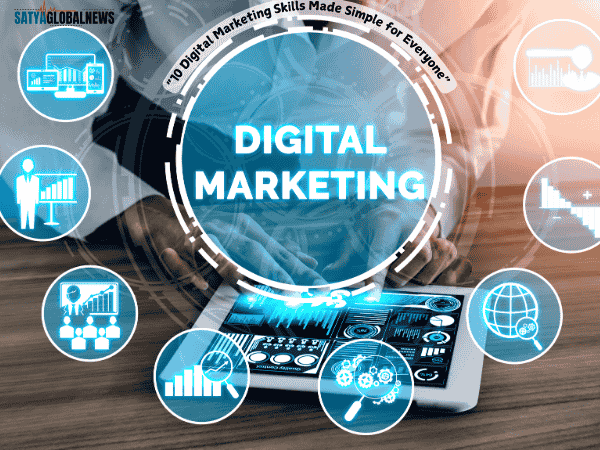“10 Digital Marketing Skills Made Simple for Everyone”
Digital marketing doesn’t have to be complicated. Whether you’re a beginner or looking to sharpen your skills, mastering the right techniques can help you grow your business or personal brand. This guide breaks down 10 essential digital marketing skills in an easy-to-understand way, from creating engaging content and improving your visibility on search engines to connecting with your audience on social media and using data to make smarter decisions. Start small, stay consistent, and watch your online presence thrive!

Mastering digital marketing doesn’t have to be overwhelming. Here are 10 essential skills explained in a simple, relatable way that anyone can understand and apply.
1. Content Creation (Telling Great Stories Online)
What it is: Writing blogs, creating social media posts, or making videos that people enjoy and find useful.
Why it matters: Great content keeps people engaged and builds trust with your audience.
How to get better:
- Compose like you’re conversing with a companion.
- Use simple tools like Canva for visuals.
- Center around helping, not simply selling.
2. Search Engine Optimization (SEO) – Helping People Find You
What it is: Tweaking your website and content so they show up on Google when people search for things.
Why it matters: If they can’t find you, they can’t buy from you!
How to get better:
- Use words that people search for (keywords).
- Make your site quick and mobile-friendly.
- Compose content that responds to normal inquiries.
3. Social Media Marketing (Engaging with Your Audience)
What it is: Using platforms like Instagram, Facebook, and TikTok to connect with people and share your brand.
Why it matters: Social media helps build relationships and trust with customers.
How to get better:
- Post consistently.
- Engage with followers (reply to comments and messages).
- Try different types of content—photos, videos, and polls.
4. Email Marketing (Sending Friendly and Helpful Emails)
What it is: Sending emails with updates, offers, or useful tips to your audience.
Why it matters: Email is personal and can turn one-time visitors into loyal customers.
How to get better:
- Keep emails short and engaging.
- Use catchy subject lines to grab attention.
- Offer value, not just promotions.
5. Paid Advertising (Getting Noticed Faster)
What it is: Paying for ads on Google, Facebook, or Instagram to reach people who are interested in what you offer.
Why it matters: It’s a fast way to get in front of the right audience.
How to get better:
- Start with a small budget.
- Use clear, eye-catching visuals.
- Target specific interests and locations.
6. Analytics (Understanding What Works and What Doesn’t)
What it is: Tracking data from your website, social media, and ads to see what’s working.
Why it matters: It helps you focus on what brings results and avoid wasting time.
How to get better:
- Utilize free instruments like Google Analytics.
- Check which posts or ads perform best.
- Adjust your strategy based on what people like.
7. Copywriting (Writing Words That Inspire Action)
What it is: Crafting words that convince people to click, buy, or sign up.
Why it matters: Good copy turns visitors into customers.
How to get better:
- Center around benefits, not simply includes.
- Write clear and persuasive headlines.
- Use simple, everyday language.
8. Video Marketing (Telling Stories Through Video)
What it is: Creating videos to showcase your products or share useful information.
Why it matters: People love watching videos more than reading text.
How to get better:
- Keep videos short and engaging.
- Use free tools like CapCut or InShot.
- Be legitimate — individuals associate with genuine stories.
9. Customer Engagement (Building Strong Relationships)
What it is: Responding to messages, comments, and feedback to make people feel valued.
Why it matters: Happy customers are loyal and recommend your brand to others.
How to get better:
- Reply quickly and genuinely.
- Request input and use it to get to the next level.
- Show appreciation to your audience.
10. Marketing Automation (Working Smarter, Not Harder)
What it is: Using tools to schedule posts, send automatic emails, and track customer actions.
Why it matters: It saves time and ensures you stay consistent.
How to get better:
- Try tools like Mailchimp for emails and Buffer for social media.
- Set up welcome emails for new customers.
- Automate repetitive tasks, but keep the human touch.
Want to improve in any of these areas? Start small, be consistent, and enjoy the learning process!
FAQ
-
Do I need prior experience to learn digital marketing?
No, digital marketing is beginner-friendly! You can start with the basics like social media marketing and content creation, and gradually explore more advanced topics like SEO and analytics.
-
Which digital marketing skill should I learn first?
Start with content creation and social media marketing since they are easy to grasp and widely used. As you get comfortable, move on to SEO and paid advertising skills.
-
How long does it take to learn digital marketing?
The time it takes depends on your effort and consistency. With regular practice, you can grasp the basics in a few weeks, but mastering it takes continuous learning and application.
-
Do I need to spend money to succeed in digital marketing?
Not necessarily! Many skills, like content writing, SEO, and social media engagement, can be done for free using the right strategies. However, paid ads can help you grow faster.
-
What are the best free tools to help with digital marketing?
Some great free tools include:
Canva for creating graphics
Google Analytics for tracking website performance
Grammarly for writing assistance
Buffer or Hootsuite for scheduling social media posts -
How can I stay updated with digital marketing trends?
Follow industry blogs, subscribe to newsletters, and watch free online courses from platforms like Google Digital Garage, HubSpot Academy, and YouTube.




